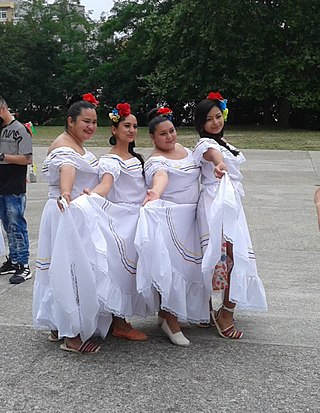
As of 7 November 2024, Spain had a total population of 48,946,035 The modern Kingdom of Spain arose from the accretion of several independent Iberian realms, including the Kingdoms of León, Castile, Navarre, the Crown of Aragon and Granada, all of which, together with the modern state of Portugal, were successor states to the late antique Christian Visigothic Kingdom after the Reconquista.

Immigration to Spain increased significantly in the beginning of the 21st century. In 1998, immigrants accounted for 1.6% of the population, and by 2009, that number had risen to over 12%. Until 2014, the numbers were decreasing due to the economic crisis, but since 2015, immigration to Spain has increased again, especially after 2021.
Indians in Spain form one of the smaller populations of the Indian diaspora. According to the statistics of India's Ministry of External Affairs, they number only 35,000, or 0.07% of the population of Spain. 2009 statistics of Spain's Instituto Nacional de Estadística showed 35,686 Indian citizens in Spain; this figure does not include persons of Indian origin holding other citizenships. Most Indians originally migrated to Spain from Africa, while others came from India and even Japan and Southeast Asia. The overwhelming majority of Indians in Spain live in the Barcelona area. According to data from 2021, Indians in Spain number more than 57,000.
Moroccans in Spain formed 16.4% of the 4,549,858 foreigners in Spain as of 1 January 2017. They are again the largest foreign group in Spain, after they were surpassed temporarily by Romanians in 2007. In 2003, they were estimated to make up about 6% of all Moroccans abroad. In 2022, the number of Moroccans in Spain increased to about 1,000,000.
Pakistanis in Spain form one of the country's larger migrant communities. Their numbers began to grow rapidly in the early 2000s.
Russians in Spain form one of the country's smaller foreign communities, making up about 0.83% of all foreigners in Spain.
As of 2022, official statistics showed 265,949 Peruvian-born residents in Spain. Out of these, 143,867 were Spanish citizens and 122,082 had not yet acquired Spanish citizenship.
Romanians form the second largest group of foreigners in Spain, after Moroccans. As of 2023, there were 630,795 Romanian citizens living in Spain. Most of the immigration took place given economic reasons. The linguistic similarities between Romanian and Spanish, as well as Romanians' Latin identity, are also a reason for the country's attractiveness to Romanians.
Iranians in Spain have a history going back for over a millennium and form a minor population in modern day. They are a part of the Iranian diaspora.

Bulgarians in Spain are one of the largest communities of the Bulgarian diaspora. According to official 2019 data, they numbered 197,373, making them the tenth-largest emigrant community in Spain and the second-largest among Central and Eastern European emigrant communities.

Argentines in Spain are the largest community of Argentines abroad. In Spain, they represent one of the largest immigrant groups in the country.

Ecuadorians in Spain have comprised a sizable community in Spain since the early 2000s. As of 2022, the number of immigrants from Ecuador residing in Spain, including those with Spanish citizenship, comprised 420,195.

The presence of Colombians in Spain dates back to Colombian independence from Spain.

Dominicans in Spain from the Dominican Republic make up about 1.66% of all foreigners in Spain, this includes immigrants and people of Dominican descent born in Spain. The first country of destination for Dominicans in Europe is Spain, and it is the country with the most Dominican migrants outside of the United States.
The Albanians in Spain are people of full or partial Albanian ancestry and heritage in Spain. They trace their ancestry to the territories with a large Albanian population in the Balkans among others to Albania, Greece, Kosovo as well as to Italy.
Italians in Spain are one the largest communities of immigrant groups in Spain, with 260,000 Italian citizens in the country, of which 143,000 were born in Italy.
The presence of Algerians in Spain dates back to the 1990s.
The presence of people from Equatorial Guinea in Spain dates back to the 1990s.







